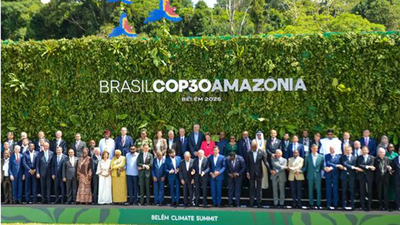NEW DELHI: India has welcomed the key outcomes of the 30th session of the UN climate conference (COP30), saying it recognised the need for adaptation in developing countries and would not shift the burden of climate change mitigation (emission reduction) onto the shoulders of those who have the least responsibility in causing the problem. The annual conference concluded in the Brazilian city of Belem late Saturday.”A substantive decision on adaptation is a manifestation of the principle of equity and a recognition of the overwhelming need for adaptation in developing countries,” said Union environment minister Bhupender Yadav in his post on X on Sunday, while appreciating the Brazilian Presidency’s efforts in foregrounding the issue of climate finance.The decision to triple the adaptation finance means increasing it to around $120 billion annually by 2035 from the current $40 billion annually. Though it would be part of the overall climate finance of $300 billion annually by 2035, the move at least gave a much-needed push to the cause of adaptation in developing countries.Besides deciding to triple the funds needed by developing countries to adapt themselves to face the impacts of climate change, the COP30 also decided to develop a ‘just transition mechanism’ to support countries in protecting workers and communities as they shift to clean energy; and launch a ‘global implementation accelerator’ – a two-year process to close the gap between current national climate plans and what is required to keep the global warming within 1.5 degree Celsius. The outcomes are, in fact, aligned with what India had been telling the forum not to expect the developing countries to fill in for the failure of the rich historical emitters, and also not to allow developed nations to carry on with unilateral trade measures such as the EU’s Carbon Border Adjustment Mechanism (CBAM) in the garb of climate action.India has long been opposed to the CBAM, which is to be implemented from next year. The mechanism will impose a border tax on carbon-intensive goods such as iron and steel, aluminium and cement entering the 27 European Union nations, placing a tariff burden on products from developing countries, including India and China.The COP30 agreement has, at least, acknowledged the concerns, noting that the response measures on climate change must not constitute “disguised restrictions on international trade”.Thanking the COP30 Presidency for delivering the space to discuss unilateral trade-restrictive climate measures, India in a statement, said that these measures are increasingly affecting all developing countries and are violative of the principles of equity and CBDR-RC, enshrined in the Convention and its Paris Agreement.The statement, delivered by the country’s representative at the closing plenary of the COP30 on Saturday, stressed that these issues cannot continue to be brushed under the carpet. “The Parties (countries) have made a beginning here to reverse this trend,” it said.Expressing satisfaction over the decision to establish the ‘just transition mechanism’, India called it a “significant milestone” and hoped that it would help operationalise equity and climate justice at both global and national levels.




